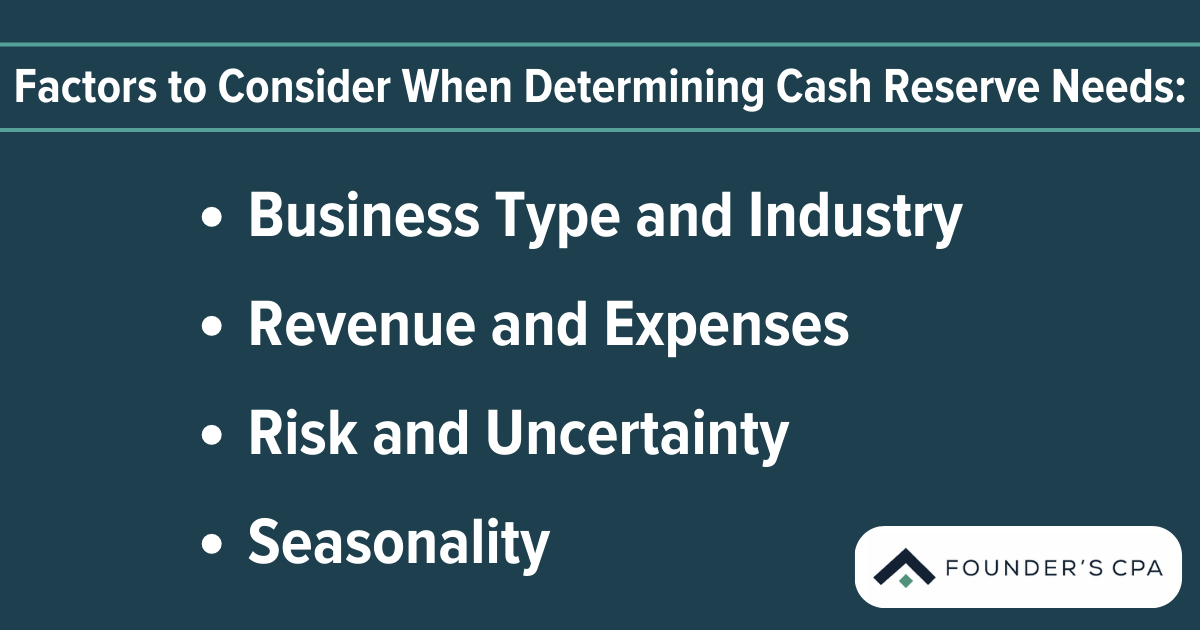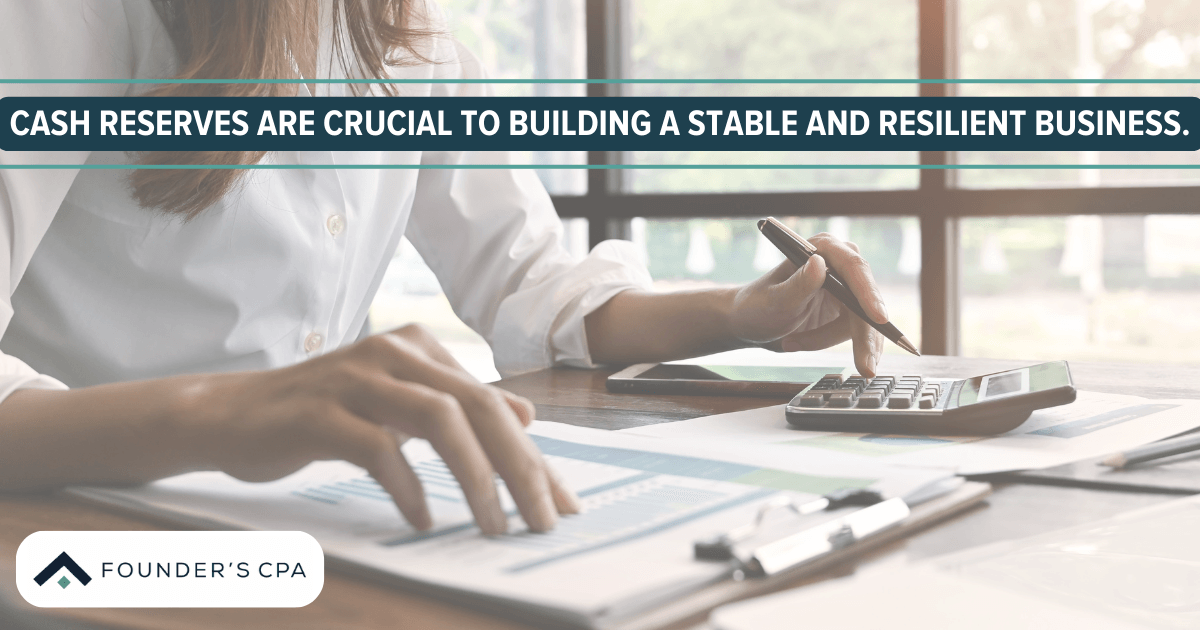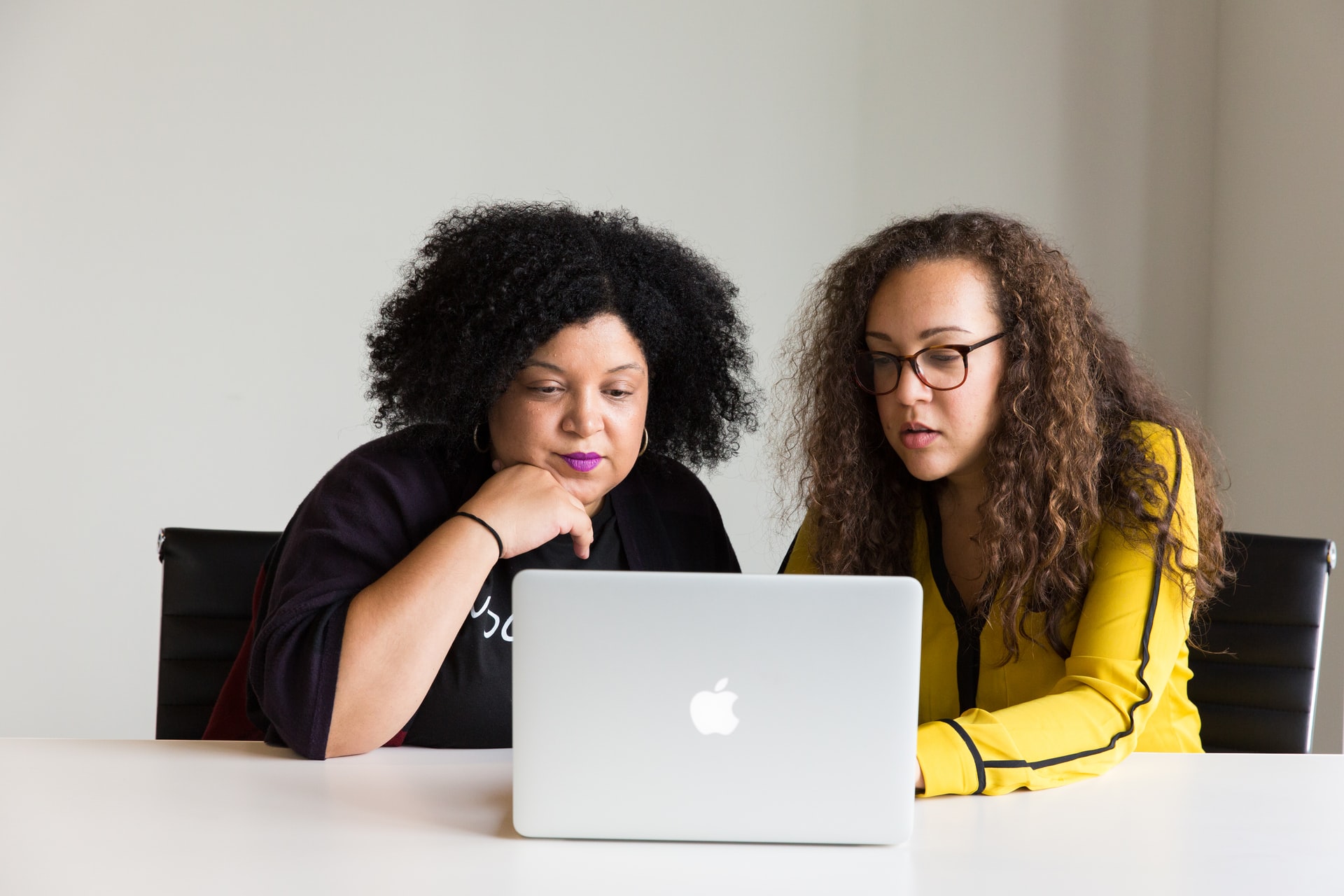Cash; how much should a business have in reserve?
Most business owners sleep better with some financial cushion, particularly with high fixed costs like salaries, rent, or debt. But what’s the right amount for your company? And what is a cash reserve anyway?
Cash reserve is an amount an individual or business holds to pay for short-term needs and emergencies. The right amount of cash reserves depends on various factors, and business size, industry, and stage play a role, and many experts say a cushion of 3-6 months’ worth of expenses is ideal.
Cash reserves build a stable foundation for your business and increase its resilience and chances of long-term success. With them, you are more likely to be able to fund unexpected expenses or dry spells, such as repairs or unplanned disruptions.

Factors to Consider When Determining Cash Reserve Needs
Business Type and Industry
The size of the business, its industry, and its financial condition affect how much a company should have in reserve.
For example, a manufacturing company may want to build reserves to account for the fluctuating upfront cost of inputs and finished goods. An industry with a high-volume sales model must also plan enough reserve funds to pay for unexpectedly large production runs.
Or, a small business owner who has just started their company may prefer paying cash for everything, only taking out loans or other forms of financing once they have proven themselves and developed their client base. That same small business may manage with smaller (or no) reserves because operating expenses are lower. However, this optimism could prove risky because you can’t predict the future, and businesses require liquidity.
Revenue and Expenses
Revenue and expenses play significant roles in business cash flow. Predicting how much money you’ll make in a month can be challenging with constantly changing income.
Of course, negative cash flow could mean losing money — or going out of business entirely. But with enough reserve cash, you can bridge unexpected expenses or unforeseen events without severely impacting your business.
Risk and Uncertainty
Uncertainty is the inability to predict what will happen, and risk is the possibility that something unforeseen will harm your business.
The best way to manage these is by diversifying your investments to have options if one goes south. Financial reserves can give you opportunities to help you withstand unexpected events or market downturns better than other businesses.
Financial reserves allow you to endure difficult times without:
- Cutting costs
- Eliminating positions in your business model
- Requesting additional funding from investors.
You may need to liquidate assets or even shut down entirely without enough savings.
Seasonality
Seasonality also determines how much a business must keep in liquid assets. Merchants typically seeing higher sales and activity during certain seasons (i.e., Christmas, Halloween, summer, etc.) could flex staffing levels to meet seasonal demands or peak times.
But certain financial obligations are fixed, like rent, manager salaries, or taxes, and savvy founders will set aside enough reserves to cover dry periods.
How to Calculate Your Optimal Cash Reserve Amount
A formulaic approach and scenario analysis are two widely accepted methods for determining your optimal cash reserve amount.
The Formulaic Approach
The formulaic approach (e.g., percentage of annual revenue, number of months of operating expenses) is a popular method because its simple to calculate, and the results are easy to understand.
Although these formulas help get you started, they may ignore essential factors that impact your cash flow. To get a more accurate figure, you also need to consider the following:
- Your company’s sales volume and profit margins
- The fixed and variable costs of running your business (salaries, utilities, office supplies)
- How much extra cash will your company need if it has problems with its suppliers or customers
Scenario Analysis
A more precise way to calculate your optimal cash reserve is through scenario analysis. These methods involve assessing the potential impact of risks.
The following will help you calculate how much to keep in reserve:
- Identify your business’s strategic objectives (e.g., profit, growth, productivity)
- Determine the various possible scenarios that could occur over the next few years (e.g., economic downturn, market conditions)
- Calculate the expected value of each plan and make an informed decision about what reserves you need based on that information
Best Practices for Managing Cash Reserves
Regular Monitoring and Updating
Although cash reserves can save you a lot of headaches during challenging times, any cash you hold in reserve isn’t working directly for your business.
Thus, regularly monitoring and updating your cash reserves is vital to ensure you always have cash available, even if unexpected market conditions develop.
Diversification of Cash Reserves
Keeping your entire cash reserve in a savings account may be tempting, but a diverse portfolio, including cash on hand, cash in the bank, and money market deposits, is safer. Diversely investing a portion of that cash will reduce the risk of significant losses due to a single investment.
Avoiding Over-reliance on Debt
Companies with little cash reserves may end up relying too heavily on debt. This strategy can work in times of loose credit and easy money. But if the economy turns or lending standards become tight, you may be forced to accept unfavorable conditions or make brutal cuts.
Examples of Companies with Effective Cash Reserve Strategies
The cash a business should have in reserve depends on its type, industry, and the number of products sold.
- Large corporations (e.g., Apple and Amazon) often have higher cash reserve levels than small businesses. They can use their massive cash flow to build a significant cushion against potential losses.
- Small companies often have lower cash reserve levels but lower fixed expenses. They can still use the buffer to pay suppliers and employees or for other short-term needs, such as repaying loans or buying inventory.

How Much Should a Business Have in Reserve?
Although sometimes neglected, cash reserves are crucial to building a stable and resilient business. Getting caught up in the hype of investing every cent back into the business to achieve rapid growth and overlooking strategic financial planning is easy, but things can go wrong.
The optimal cash cushion allows you enough free cash flow to grow your business but will enable you to handle an unexpected business setback without going under. Founder’s startup and small-business finance experts can help determine how much cash reserve is adequate for your business and where to put the rest. Contact us today to get started.




